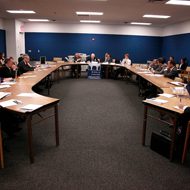MPI Event Report
October 18, 2010
 |
|
|
(L-R): Ambassador Cabactulan, Senator Roche, Ambassador Strohal and Alyn Ware
|
During the panel, “Routes to Elimination,” on October 18, the President of the 2010 NPT Review Conference called on middle power states to link the quest for a Nuclear Weapons Convention (NWC) to renewed adherence to international humanitarian law. Ambassador Libran Cabactulan of the Philippines said the attention paid at the NPT Conference to humanitarian law, which prohibits mass destruction, should energize those working for a nuclear weapons free world. “The movement toward a Nuclear Weapons Convention needs a groundswell of public support,” Ambassador Cabactulan said. “The middle power states must start to act.”
The theme of the panel was based on the NPT 2010 Final Document statement referring to “consideration of negotiations on a Nuclear Weapons Convention or agreement on a framework of separate mutually reinforcing instruments.” The panel paid special attention to the accompanying words in the Final Document that “all states need to make special efforts” toward the elimination of nuclear weapons.
 |
|
|
PNND India Member Mani Shankar Aiyar
makes an intervention; Indian Ambassador Halid Ali Rao is to his right and James O’Shea from the Irish Mission looks on. |
The event was co-sponsored by the Permanent Mission of Austria to the UN and Middle Powers Initiative and chaired by former Senator Douglas Roche, founding chairman of the Middle Powers Initiative. Senator Roche explained in his opening statement that the objective of the event was to exchange ideas on how to move forward with the action plan on nuclear disarmament adopted by the 2010 NPT Review Conference, which included the new and potentially historic provision on consideration of a NWC or framework.
Ambassador Christian Strohal, Permanent Representative of Austria to the Conference on Disarmament, said a series of workshops among diplomats, experts and parliamentarians could develop ways for the international community to advance towards seriously addressing the values of a Nuclear Weapons Convention. He also stressed the importance of non-nuclear weapon states that host nuclear weapons or are part of multilateral or bilateral military alliances with nuclear powers to engage with nuclear weapon states in an effort to get these to revise their military doctrines.
 |
|
Alyn Ware, Global Coordinator of Parliamentarians for Nuclear Non-Proliferation and Disarmament, called for preparatory work towards a Convention to be started immediately. “The first such preparatory conference could be held in 2011 in order to build on the momentum from the 2010 NPT Review Conference,” he said. He outlined a number of practical measures that non-nuclear or nuclear weapon States could take to build the prohibition norm, develop implementation mechanisms, build political momentum, enhance non-nuclear security and phase out nuclear deterrence as part of a preparatory process for a NWC.
Each of the panelists expressed optimism as a result of recent developments that have generated momentum in the field of nuclear disarmament. Examples cited included the recent High-Level Meeting held by Secretary-General Ban Ki-moon to address ways to revitalize the multilateral disarmament machinery, the adoption of the 2010 NPT Review Conference Final Document, and the upcoming meeting of the P5 in France to discuss ways to revitalize the Conference on Disarmament and continue multilateral disarmament efforts. The panelists agreed that these events are evidence of the global consensus on the ultimate goal of the complete elimination of nuclear weapons and the seriousness of the key players involved to progress with practical steps leading to this objective.
» Download the prepublication version of “Nuclear Weapons and Compliance with International Humanitarian Law and the Nuclear Non-Proliferation Treaty,” in the forthcoming Fordham International Law Journal, by Charles J. Moxley, Jr., John Burroughs and Jonathan Granoff, Winter, 2011, No. 34.
//
![]()
Jonathan Granoff is the President of the Global Security Institute, a representative to United Nations of the World Summits of Nobel Peace Laureates, a former Adjunct Professor of International Law at Widener University School of Law, and Senior Advisor to the Committee on National Security American Bar Association International Law Section.







